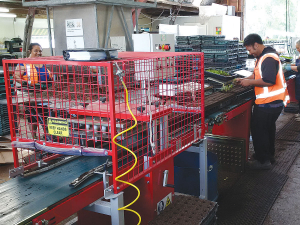Marlborough Demo Highlights Role of AGVs in Sustainable Winegrowing
The air was unseasonably crisp in the upper Wairau Valley in mid-December as two autonomous ground vehicles moved methodically through the vines, spraying each row in turn.
 Automated dribbling lines remove the manual element of potting production, while also allowing customisation to suit individual crops.
Automated dribbling lines remove the manual element of potting production, while also allowing customisation to suit individual crops.
With the hort industry struggling to attract staff at key times of the growing season, many businesses are taking the leap to automation.
Automation offers potential increases in productivity and quality, better returns and – importantly – a boost in team morale.
PrimeHort, based in Kaiwaka Northland, services the horticultural industry with an extensive range of products from basic handles, pots and garden hoses through to high end automation for commercial growers.
Growers and nurserymen will know that manual dibbling carried out by inexperienced staff is laborious, repetitive and often unreliable. Poorly dibbled holes can lead to seedling damage, with anyone currently filling trays by hand or poking holes manually likely to agree that the process is slow and clunky.
As NZ exclusive distributors of the Italian specialist Da Ros Machinery, PrimeHort has provided mechanised solutions to more than 700 nurseries nationwide, with business continuing to grow year on year. Da Ros automated dibbling lines remove the manual element of potting production, while also allowing customisation to suit individual crops and the facilities where they are grown.
While the initial investment in a system might be around $80,000, the machinery typically pays for itself in one season – particularly in the current climate of labour shortages and rising wages. Typically, automation can achieve 10 times more output than one average worker. It also allows a change of focus for existing staff, from manual work to roles that support automation – with the bonus of lifting morale.
Regarding potential output from automation, feedback suggests that nurseries that previously turned out 100,000 plants per season have upped production to 500,000 plants per season, with the same number of staff.
PrimeHort adds that Da Ros machinery is particularly suited to NZ natives. Despite these having varying root structures and lack of uniformity among these plants, the dibbler line will drill holes with consistency in trays to suit all crops. Additionally, the dibbling heads can be changed to use a press plate or rotating drills to suit different plants, tray sizes, planting depth and position – all prerequisites for consistent quality and output.
Designed to offer a modular approach, users can start their journey to automation with a tray filler component.
This removes the labour intensive work of handling, filling, compacting and repeating the operation. In a singlepass, the unit will fill the soil, punch the holes and deliver around 400 dibbing- ready trays every hour.
Investment Pays Off
Adam Thompson, of Restore Native at Te Miro, Cambridge, invested in a new Automated Dibbling Line from PrimeHort to assist his company’s production of native re-veg lines for native forest restoration and riparian planting.
He says plantings are quite diverse with numerous species such as mānuka, Carex testacea and kahikatea, which all grow quite differently and need different container sizes when planted from seedlings.
“This means at production time the tray sizes we use and grades we plant into can be quite varied between plant species,” Thompson explains.
“The Automated Dibbling Line gives us extra flexibility at planting time and also speeds up what would normally be a labourintensive planting job for our staff.”
He says this has resulted in less time spent in production.
“This gives staff have more time with quality control and ensuring what we sell is the best quality.”
OPINION: "We are back to where we were a year ago," according to a leading banking analyst in the UK, referring to US president Donald Trump's latest imposition of a global 10% tariff on all exports into the US.
DairyNZ says the Government’s proposed Resource Management Act reform needs further work to ensure it delivers on its intent.
Overseas Trade Minister Todd McClay says he's working constructively with the Labour Party in the hope they will endorse the free trade agreement (FTA) with India when the agreement comes before Parliament for ratification.
Donald Trump's latest tariff tantrum has again thrown the world of trade into a new round of turmoil and uncertainty, and NZ is caught up in it.
The third edition of the NZ Dairy Expo, held in mid-February in Matamata, has shown that the KISS principle (keep it simple stupid) was getting a positive response from exhibitors and visitors alike.
Twenty years ago, South African dairy farm manager Louis Vandenberg was sent to a farm in Waikato to provide training on Afimilk technology.

OPINION: A mate of yours truly reckons rural Manawatu families are the latest to suffer under what he calls the…
OPINION: If old Winston Peters thinks building trade relations with new nations, such as India, isn't a necessary investment in…